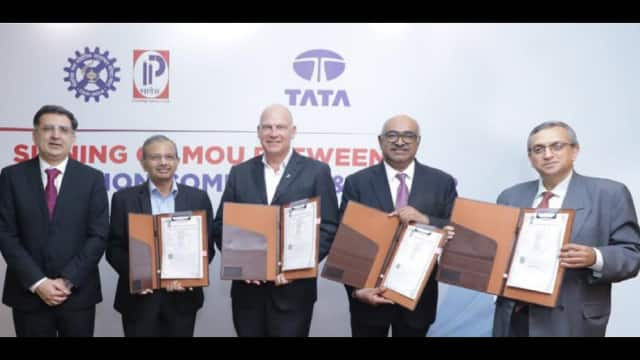Now airplanes will fly around the world with biojet fuel

As part of efforts to reduce carbon emissions in the country, CSIR-IIP (Indian Institute of Petroleum) has signed important agreements with private airlines Tata Companies, Air Vistara, Air India and Air Asia India. Under this agreement, private airlines will join the campaign to promote and use Sustainable Aviation Fuel (SAF). That is, now airplanes will be able to fly around the world with biojet fuel.
The MoU was signed with Siddharth Sharma of Tata Aviation Companies, Niyant Maru from Air Vistara, Campbell Wilson from Air India, Sunil Bhaskaran of Air Asia India at IIP on Thursday in the presence of IIP Director Dr. Anjan Ray. IIP Director Dr. Anjan Ray said that India, joining the international efforts to reduce carbon emissions, has set a target of reducing carbon emissions in the country by 65 percent through sustainable aviation fuel. Earlier this agreement has also been done with Indigo, SpiceJet. With this agreement, the environment for commercial production of biojet fuel will be created in the country, the demand for biojet fuel will increase and plants will be set up in the country to fulfill it.
The Indian Army is already using biojet fuel. Talks are on with Mangalore Refinery and Petrochemicals for commercial production of biofuel. These are subsidiaries of ONGC. Ten to 15 thousand liters of biofuel will be produced daily in these plants. Director of IIP Mohkampur (Dehradun), Dr. Anjan Ray told that at present Biojet fuel is costlier than normal oil. The reason for this is low production. But this is not an expensive deal in front of the benefits reaching the environment. Availability of biofuel is dependent on the installation of the plant. This agreement has removed that obstacle. Increasing production will also bring down costs and encourage companies to switch to biojet fuel.
Biofuel is the fuel of the future
From an environmental point of view, biofuels are being considered as the fuel of the future. Therefore, from the year 2027, the use of biofuel has been made mandatory in international flights.
Know also
IIP is currently producing 600 to 700 liters per month at its pilot plant located in its premises. Engine mileage has improved by more than one percent with Biofuel. That is to say, an average of three thousand liters of fuel per hour is spent on a Boeing 320 on a two-hour flight from Delhi to Mumbai. This consumption has been reduced by up to one percent in engines using biofuels. The country currently produces six to seven million tonnes of general aviation fuel per year. Whereas we are talking about the availability of biojet fuel at one lakh tonnes per annum. So it is less economical at the moment. This fact can be ignored from the environmental point of view.







